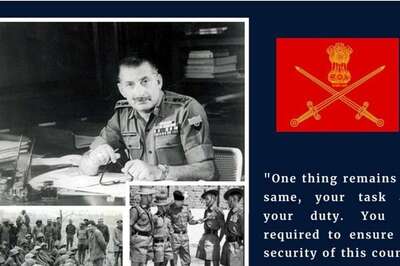
views
New Delhi: A day before Saudi crown Prince Mohammed Bin Salman was to reach India, all conversation was directed towards where the Saudi prince will come from.
MBS, as the Saudi crown prince is popularly known, was in Pakistan till Monday before heading back home, and then flew out again to India. The Saudi royal made it very clear that his visit to Pakistan had nothing to do with India, at least not directly.
MBS’s visit came in the backdrop of the Pulwama attack, for which Pakistan-based terror group Jaish-e-Mohammed claimed responsibility. While the world waited for MBS to make a statement on countering terrorism in the region, with a specific reference to Pakistan, the royal did not say much.
While in Pakistan, MBS said his country lauded the efforts by Pakistan to counter terrorism and crack down on terror financing, the joint statement released by the Ministry of External Affairs said, among other things, that the Saudi royal condemned the attack and that both India and Pakistan should work towards a peaceful relation.
With both statements, Saudis have given a clear signal that they do not want to club their ties with India and Pakistan — the relations, in every aspect, needed to be looked at as standalone relations. Former ambassador Talmiz Ahmad said that it was the Indian side where the intensity of hyphenation was a lot and that it was unfortunate.
Ahmad, who has served as envoy to Saudi, said relations between India and Pakistan were de-hyphenated over a decade ago by the Saudis. “When a major visit takes place, the country concerned is trying to promote bilateral relations in areas which are of interest to the two countries concerned. The last thing your visitor wants to do is to get embroiled in local issues because he has to maintain ties with all countries in the region. With each country, the Saudis have a different set of priorities. So, this equation is not necessary,” Ahmad said.
Ahmad’s opinion resonates well with the ministry here too as it refused to comment on Saudi’s $20 billion aid to Pakistan.
It is imperative to note that one of the biggest thorns in the India-Pakistan ties has been the listing of Jaish founder Masood Azhar as a designated UN terrorist.
Many had pinned their hopes on Saudi making a targeted statement on these lines. Instead, the India-Saudi joint statement said, “Affirming that the menace of extremism and terrorism threatens all nations and societies, the two sides rejected any attempt to link this universal phenomenon to any particular race, religion or culture… The two sides also noted the need for concerted action by the international community against terrorism, including through early adoption of the UN Comprehensive Convention on International Terrorism and underlined the importance of comprehensive sanctioning of terrorists and their organisations by the UN.”
The mention of UN designation raised a few eyebrows as many wondered whether it reflected upon Masood’s case. However, in an interview to PTI, Saudi junior foreign minister Ahmed Al-Jubeir said the line had been misconstrued.
“I think people here assumed that the joint statement had to do with one particular individual (Azhar). It did not. The intention was that the process of designation is clear and not political,” he said.
He also added that his country would not get involved between India and Pakistan “unless invited by both countries to do so”.
Pakistani political analyst Raza Rumi, too, believes that there was almost a zero chance of Saudis tying their respective bilateral relations with India and Pakistan together. “What Saudis are looking for are allies in both India and Pakistan. They will not get themselves involved in the issues between the two countries. They’d rather let the United States handle it,” Rumi said.
Saudi Arabia has always had close ties with Pakistan, something which was further cemented when Prime Minister Imran Khan made a visit to the desert kingdom last year. Riyadh offered $6 billion in funds during Khan’s visit, other than pumping in investments worth $20 billion during his recent visit. The aid comes at a crucial time as Pakistan stares at an economic crisis. It is currently looking at a bailout from IMF too.
With respect to India, Ahmad noted that the government can take complete satisfaction from the statement since various important topics were discussed. “Maritime engagement, for instance, is a new layer to our relationship with the Saudis. Having Prime Ministerial level talks and NSA level talks is a very important step in strengthening our ties,” Ahmad added.
Saudi turning to Asia for allies is also significant as one the major after effects of the murder of Jamal Kashoggi was a sort of alienation of the kingdom as we know it. There is very little chance that Saudi’s de-facto leader MBS will repeat the lavish receptions he was part of last year with US President Donald Trump, UK PM Theresa May, French President Emmanuel Macron.
















Comments
0 comment